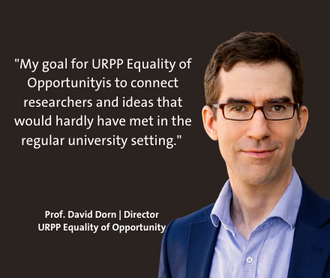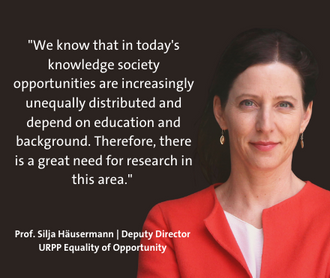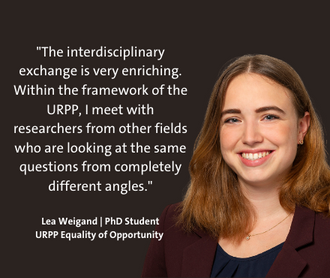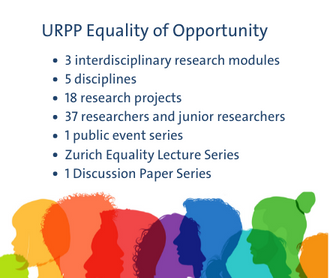Navigation auf uzh.ch
Navigation auf uzh.ch
Equality of opportunity is a significant feature of a well-functioning democratic society. Increasing economic and social inequalities are therefore perceived as major challenges in public and academic discourse. Many subjects in the social sciences and humanities deal with issues of equality and inequality, but often there is little overlap between these discourses. Even fundamental questions, such as the definition of concepts like 'equality of opportunity' or 'inequality', have not been conclusively clarified.
David Dorn, UBS Foundation Professor of Globalization and Labor Markets at the Department of Economics, initiated and has been leading the University Research Priority Program (URPP) "Equality of Opportunity" since 2021, together with political scientist Silja Häusermann and legal scholar Matthias Mahlmann. As part of the URPP, researchers from economics, law, political science, sociology, history and philosophy examine the various dimensions of equality and inequality in three modules.

Three modules — three perspectives
The module Economic Change examines the influence of technological innovation, globalization and other macroeconomic developments on the distribution of income and wealth within society. The focus is on questions of measuring and quantifying inequality between "winners and losers". What role did entrepreneurship, industrial structures and large inheritances have on the historical accumulation of wealth in Switzerland? How has Switzerland managed to keep the level of inequality relatively constant while it has risen massively in other Western economies? Are further education programs, tax reforms or a universal basic income the best answer to job loss through automation?
The module Social Change explores the emergence of social norms, self-categorizations and group identities, and how they shape perceptions and assessment of inequalities and thus political demand for public policies. How do the established group classifications that are emphasized in social science research and public discourse come about? To which categories do people assign themselves? How do social norms differ across countries? How do group identities affect the formulation of political demands?
The module Public Policy examines concrete possibilities for action to promote equal opportunities. What role can legal frameworks such as the prohibition of discrimination play? How can the education system contribute to reducing the intergenerational transmission of economic and social disadvantage? How do different reforms of the tax system affect income and wealth inequality, and how can reforms be implemented without undesirable economic side effects?

Successful interim assessment
To find innovative answers to these questions, interdisciplinary cooperation is particularly valuable. "My goal is to connect researchers and ideas that would hardly have met in the regular university setting" explains David Dorn, initiator and director of the URPP. The URPP has achieved a great deal in its first two years of existence: around twenty new positions have been created for young researchers at all levels from doctorate to assistant professorship, who have tackled a large number of research projects. The research activities and internal events of the URPP are complemented by the public event series "Zurich Equality Lecture Series" which invites leading experts to present new research findings from the URPPs range of topics to a broad audience. The great strength of the UFSP is its diverse and interdisciplinary group of researchers within UZH, complemented by a network of international research contacts — as to reduce the many existing inequalities, findings from a single discipline will not suffice.

The University of Zurich promotes interdisciplinary cooperation between scientists on important research topics. To this end, it has been funding interdisciplinary projects within the framework of the University Research Programs (URPPs) since 2005. The URPPs are intended to expand the research profile of UZH, support young researchers and initiate synergies, networks and structures that continue beyond the duration of the research projects.
